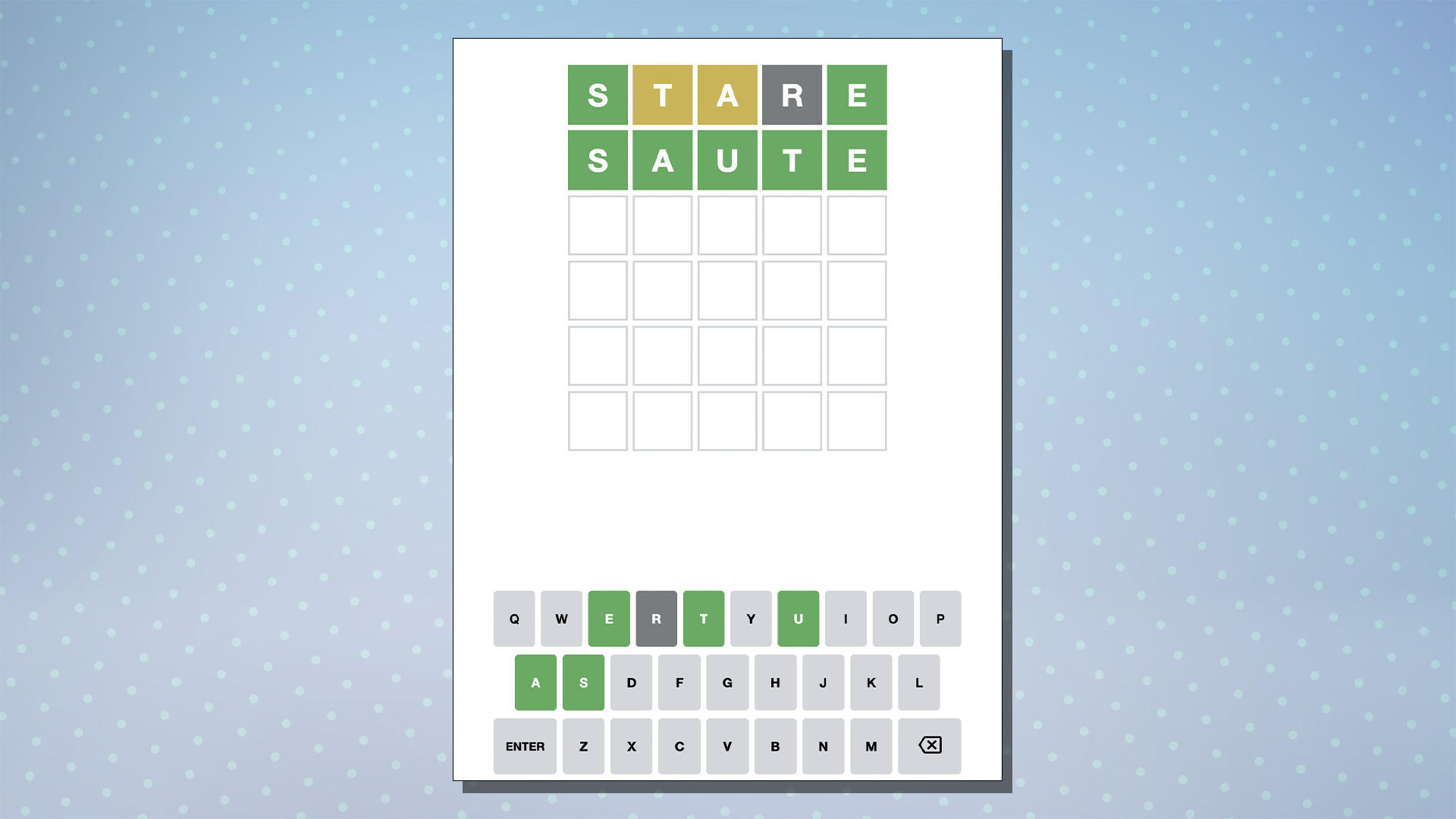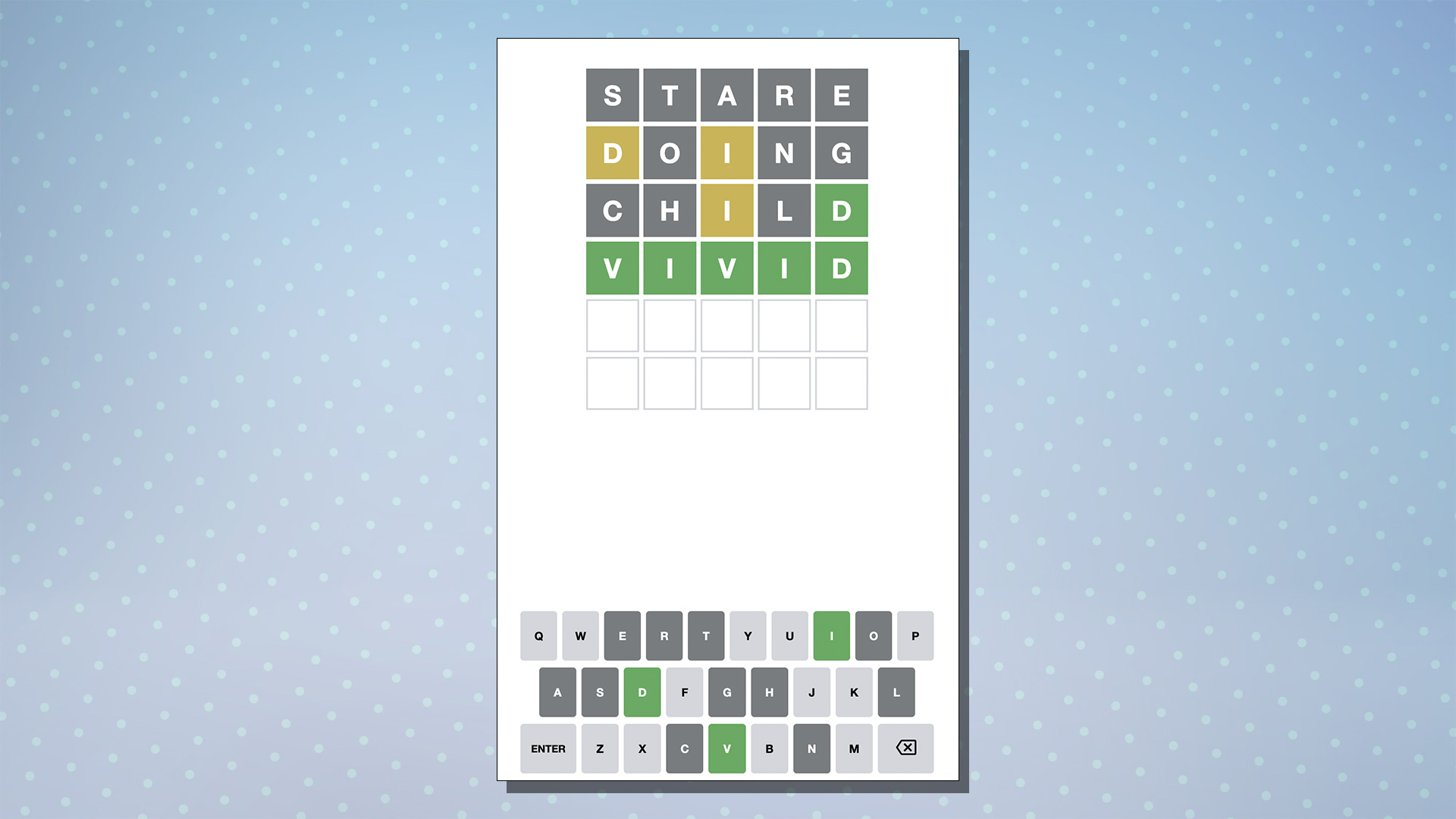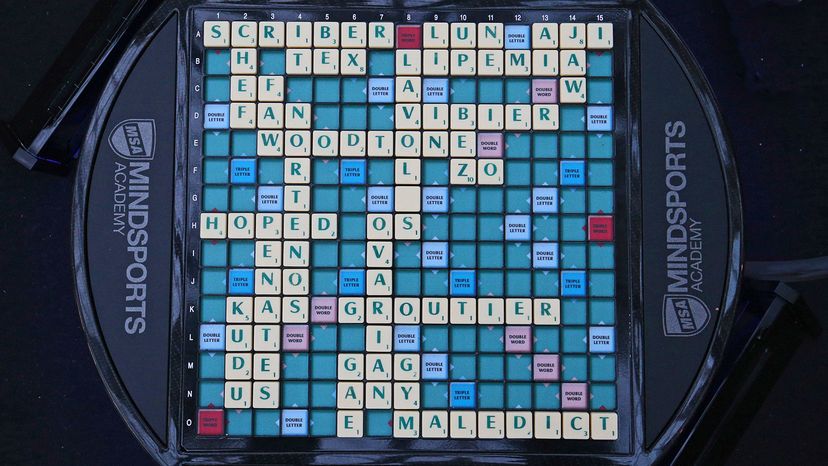Words are powerful, and a masterful use of words can change the world. At the same time, words have a fun side to them too. While the English language often seems to exist purely to confuse us, English also has a silly side that can make us laugh and smile. Are you skeptical? Well, we have dug deep into the English toy box to find a bunch of different ways we can play with words. Fair warning: those that have a low tolerance for dad jokes will want to leave immediately.
Puns
By definition, a pun is a humorous use of a word with multiple meanings or a funny use of a word as a substitute for a similar sounding word. The related terms punning, play on words, and paronomasia are often used to refer to the act of making puns. The term double entendre refers to a type of wordplay that also uses words with multiple meanings, albeit usually in a more risqué manner than a whimsical pun.
Examples of puns
Puns that involve words with multiple meanings:
- The young monkeys went to the jungle gym for some exercise.
- The investor in the bakery demanded a larger piece of the pie.
- The art competition ended in a draw.
- The maestro turned away from the orchestra as they told him the bad news; he couldn’t face the music.
Puns that involve similar sounding words:
- She claimed the big cat was a tiger, but we knew she was lion.
- When he asked me what the flowers should smell like, I told him to use common scents.
- As it turned out, the runners themselves had rigged the race. It was an inside jog.
- The negotiations over the birds went poorly; neither side would give a finch.
Tom Swifty
A Tom Swifty is a fun use of words that follows a quote, usually said by a fictional Tom, using a punny adverb. The term Tom Swifty was coined by writer Willard Espy and named after the Tom Swift series of books, which tended to use a lot of adverbs to describe dialogue.
Examples of Tom Swifties
- “I have frostbite,” Tom said coldly.
- “I’m stocked on all the essentials,” Jess said needlessly.
- “We feel really bad about what we did,” the children said shamefully.
Stinky Pinky
Stinky pinky, also known as stinky pinkie and by many other names, is a word game in which players try to guess a rhyming phrase based on a definition. The phrase “stinky pinky” itself is a possible answer when playing the game. It is unknown who invented the game or named it, but word games with the name “stinky pinky” can be traced back to at least the 1940s.
Stinky Pinky examples
- Clue: “Stone timepiece” Answer: Rock clock.
- Clue: “Road pork” Answer: Street meat.
- Clue: “A young cat’s gloves” Answer: Kitten’s mittens.
Spoonerisms
A spoonerism is a, usually accidental, swapping of initial sounds of two words. The term spoonerism is named for Oxford lecturer William Archibald Spooner, a notoriously nervous speaker who often swapped the beginnings of words when he spoke publicly.
Spoonerism examples
- It is tinner dime. (“dinner time”)
- He used to work on a bail soat. (“sail boat”)
- Happy dogs love to tag their wails. (“wag their tails”)
Kennings
A kenning is a metaphorical or poetic phrase that is conventionally used in place of another term.
Kenning examples
- gumshoe = a detective
- pencil pusher = an office worker
- tree-hugger = an environmentalist
Pig Latin
Pig Latin is a form of language, usually used by children, in which the first consonant or consonant sound is placed at the end of a word followed by the sound ā (written as “ay”).
Example: Ancay ouyay eakspay igpay atinlay? (“Can you speak pig Latin?”)
Palindromes
A palindrome is a word, phrase, or sentence that reads the same if read forward or backward.
Palindrome examples
Single words:
- madam
- eve
- noon
Multiple words:
- dog god
- ward draw
- live evil
Sentences:
- A man, a plan, a canal. Panama!
- Madam, I’m Adam!
- Was it a cat I saw?
Anagrams
An anagram is a word, phrase, or sentence formed by rearranging the letters of another.
Anagram examples
- porter is an anagram of report
- attics is an anagram of static
- pub toss is an anagram of bus stop
Antigrams
An antigram is an anagram that means the opposite of the original word or phrase it was formed from.
Examples
- on the sly is an antigram of honestly
- arise late is an antigram of earliest
- over fifty is an antigram of forty-five
Pangrams
A pangram is a phrase or sentence that includes every letter of the alphabet. The quick brown fox jumps over the lazy dog is a famous example of a pangram. Some other fun examples of things that rely on alphabet-based challenges include lipograms, heterograms, tautograms, autograms, and kangaroo words.
Ambigrams
An ambigram is a word or visual design that reads the same or creates a new word or image when flipped upside down or reversed. For example, the word dollop is an example of an ambigram because it would still theoretically read as “dollop” even when turned upside down.
Acrostics
An acrostic is a set of lines or verses where certain letters spell out a hidden message.
Example:
Curious
Agile
Territorial
Smart
Backronyms
A backronym is an existing word turned into an acronym by creating an appropriate phrase that it could serve as an acronym for.
Examples
- Ghost is a backronym of “ghoul haunting our spooky town.”
- Car is a backronym of “carrying all riders.”
- Alligator is a backronym of “a large lizard is grinning at the other reptiles.”
Do you know the difference between an alligator and a crocodile?
Rhyming, alliteration, assonance, and consonance
These four words all have to do with using words that have similar sounds. Most people are familiar with rhyming, which typically refers to using words with similar-sounding endings as in The big pig ate a fig. The word alliteration means to use words with similar-sounding beginnings or words that start with the same letter. Assonance means to use similar-sounding vowels anywhere in words when rhyming, whereas consonance means to use similar-sounding consonant sounds anywhere in words when making a rhyme.
Alliteration examples
- She sells seashells by the sea shore.
- Big bunnies bounded behind busy birds.
- Ten tenants took twenty tents to Thailand.
Assonance examples
- We see these bees.
- Leave the cleaver for the skeevy beaver.
- Doodle the Cool Poodle wants oodles of noodle strudel.
Consonance examples
- Look! The crook took cook books!
- Ross, toss the sauce to our boss Joss.
- We heard the third nerdy bird’s words.
Ready to play? take the quiz
Now that you know a multitude of ways to have fun with English, keep these terms in your back pocket with our handy word list. You can take advantage of flashcards, spelling quizzes, and more. Then, put on your party hat and have some fun with our quiz on all these types of word play!

Image: Shutterstock
One of the most effective ways for young children to gain knowledge and develop crucial abilities is through play. So, if you’re in search of some fun and educational activities to do at home, word games for kids are the perfect option to keep your little one engaged. This game also makes learning at home enjoyable and lays the foundation for successful school learning. Moreover, word games assist your kid improve their vocabulary, spelling, grammar, writing, reading, verbal, and communication skills. Parents can study alongside their kids as children like having their parents participate in their learning. In this post, we present you with a list of fantastic word games that kids and adults may enjoy together. Read on.
Benefits Of Word Games
If you are wondering why word games for children are beneficial, here are some reasons:
- Develops vocabulary
- Improves fluency in the language
- Hones comprehension and reasoning skills
- Develops a love of words and reading
- Sparks their imagination and memory
- Improves their problem-solving skills
- Encourages creativity
- Serves as a great pastime for the family
- Stimulates the brain
- Improves concentration
There are many word games for kids that help them learn new words. These games are entertaining and educational, making them enjoyable for everyone involved.
We have listed the 20 best word games for kids. These games will ensure you and your children have a great time learning new words.
1. Hangman

Image: Shutterstock
Hangman is a fun paper and pencil guessing word game for kids that can be played between two players. More players can participate and take turns as well. It is a simple game where a stickman is hanged if a player fails to get the word right.
Age group: 6 to 10 years
No of players: 2
How to play:
- Take a sheet of paper and a pen and draw gallows.
- The first player thinks of a word and draws dashes above the gallows equal to the number of letters in the word.
- The other player starts guessing the letters one by one.
- If the letter the player says is in the word, the first player writes it in the corresponding spaces on the dashes.
- If the letter is not in the word, the first player draws one part of the stickman, starting from the head and followed by the body, hands, and legs.
- If the stickman gets completed before the second player guesses the word, that player loses.
- Switch sides and start again.
- Proper nouns or slang words are not allowed.
2. Name the animal
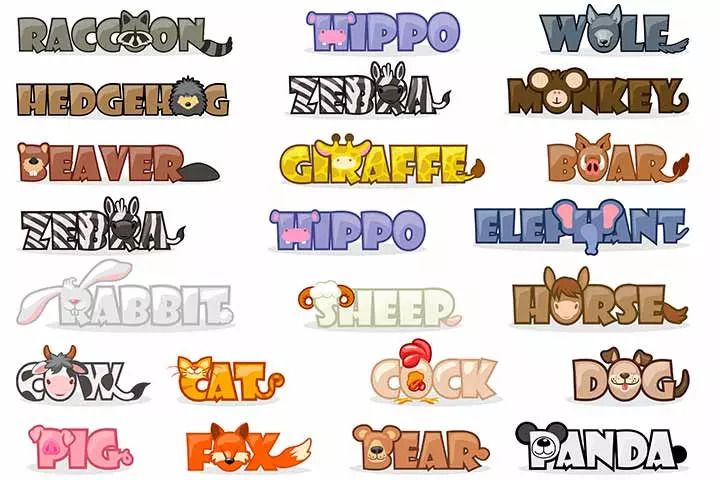
Image: Shutterstock
Name the animal is a multiplayer kids word game that can help teach your children animal names and improve their reasoning skills. This game also offers your child the opportunity to exercise their lateral thinking skills.
Age group: 4 to 7 years
No of players: 2 or more
How to play:
- You can be the host of the game.
- Make a list of common animals and a list of words that rhyme with these animal names.
- Call out each player and present them a rhyming word, and let them guess the animal name. You can say things like, “I rhyme with fog. I am a …..”
- The player who gets the maximum words correct is the winner.
- You can also teach them animal sounds by substituting animal names with their sounds.
3. I spy

Image: Shutterstock
I spy is one of the easiest games of the lot. All you need is your imagination and some eager players.
Age group: 4 to 6 years
No of players: 2 or more
How to play:
- Locate an object, and tell your child its first letter saying, “I Spy an object starting with the letter ….”
- Your child looks around and recognizes each object corresponding to that letter.
- Stop when they get it right and continue the game with the next player.
- You can also mention the color or shape of the object and let your child guess it correctly.
4. Make a word
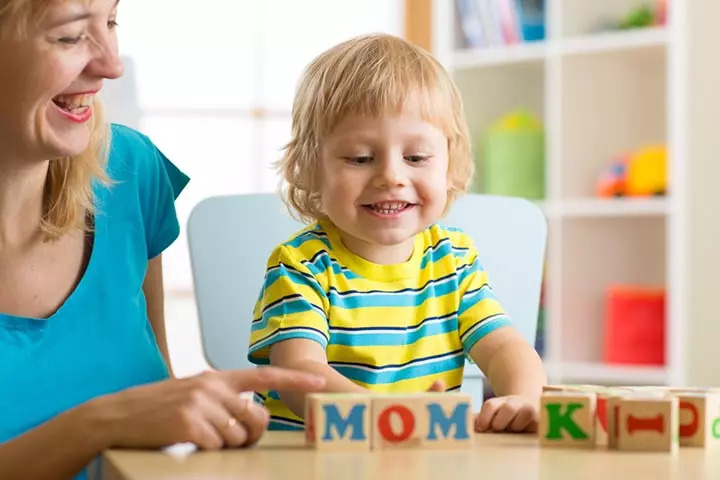
Image: Shutterstock
If your child is starting to learn new words, this word game for kids is useful. You can also play this game with older kids to make them learn difficult words and improve their memory. This game lays a solid foundation for playing advanced spelling games, such as Scrabble.
Age group: 4 to 12 years
No of players: 2 or more
How to play:
- You can play this game with younger children if you have magnetic letters, plastic letters, letter mats, or letter blocks.
- Give them a set of letters and ask them to make two- or three-letter words with them.
- For older children, you can play the game mentally or write a set of letters on a piece of paper and ask them to make as many words as they can from them.
- You can even play a timed version of the game with older children as they enjoy a good challenge.
5. Rhyming words
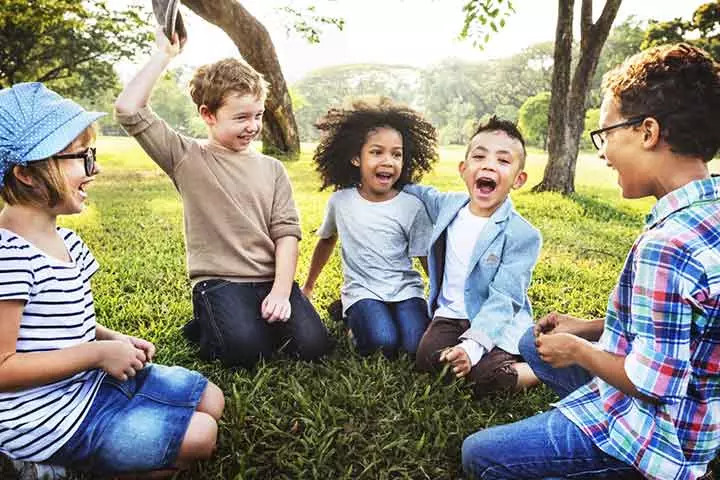
Image: Shutterstock
Rhyming Words game is a variation of Name the Animal. This word game for kids encourages your child to learn new words and helps hone their reasoning skills.
Age group: For ages 3 to 6 years
No of players: 2 or more
How to play:
- Name any animal.
- Ask your children to say the words that rhyme with the name of the animal, in turns.
- For example, when you say the word “dog,”your children should come up with words such as fog, hog, and log.
- Continue with a player until they run out of words and repeat the game with the next player.
6. Name, place, animal, thing
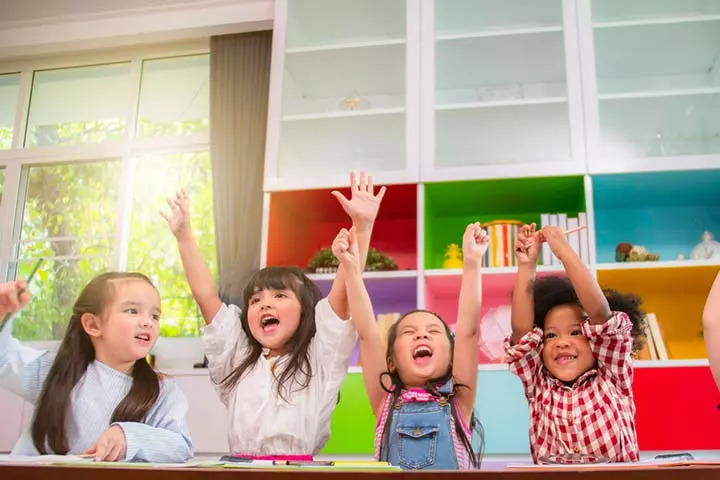
Image: IStock
You might remember playing this game as a child yourself. This game helps in expanding your child’s knowledge and memory.
Age group: 5 years and above
No of players: 2 or more
How to play:
- Give each player a sheet of paper and a pencil.
- Say a letter of the alphabet and start a timer.
- Each player must write the words of a name, place, animal, or a thing starting with that letter. For example, if the letter is A, a player may write, “Alex, Australia, Ape, Apple,” under each of these categories, respectively.
- You can assign different letters to different players or the same letter to each one.
- You can include other categories as per your convenience.
7. Hink pink
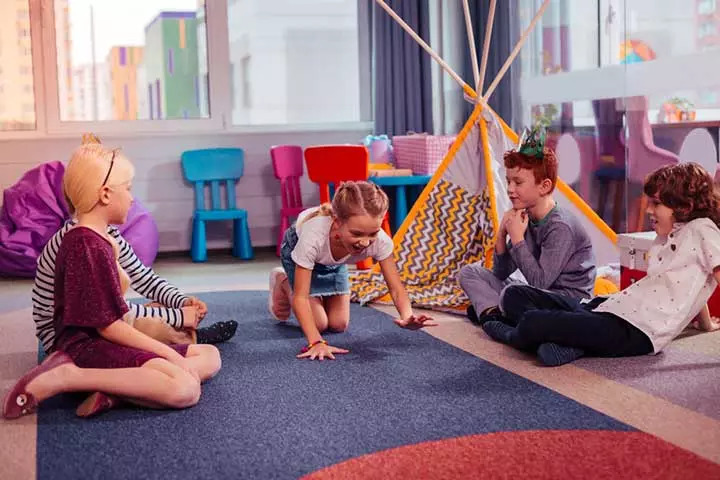
Image: Shutterstock
Children love this game. This word game for kids is designed to maximize fun while learning new words and their meanings. The game can help improve your child’s ability to solve crossword puzzles and cryptic crosswords.
Age group: 4 to 12 years
No of players: 2 or more
How to play:
- Ask each player to come up with a set of rhyming monosyllabic words, e.g., fat rat.
- Help them make a clue about their words. In this case, the clue will be “a rodent that is not thin.”
- Each player says their clue aloud, and the others try to guess what the rhyming words are.
- If the children are older, you can play Hinky Pinky (two-syllable words) or Hinketty Pinketty (three-syllable words). You can even make different combinations between different syllabic words.
- Ask the children to act out the words too so that all of you have lots of fun while the children learn difficult words.
- Here are some more words to get you started: Thin Pin, Big Pig, Tan Pan, Fan Man.
8. Guess the correct word
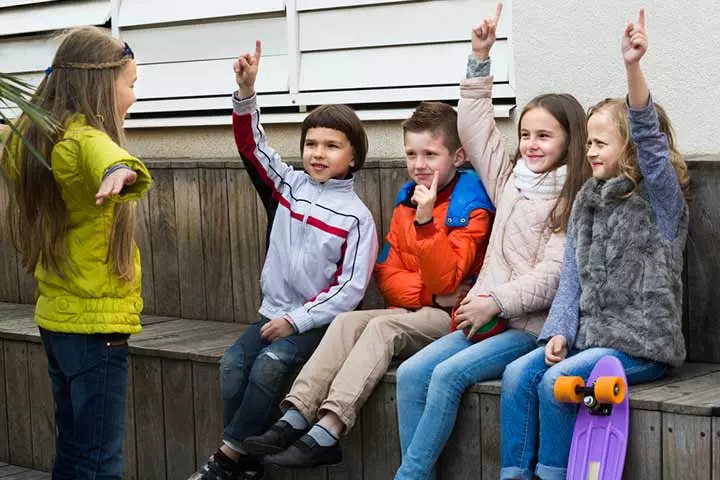
Image: Shutterstock
This word game for kids, if played mentally, is an excellent way to boost your child’s memory. It is a simple game and can be played with pencil and paper if you want to keep score.
Age group: 6 years and above
No of players: 2 or more
How to play:
- The first player thinks of a word and announces its first letter and the number of letters in the word to the others. If the player has thought of the word “Bananas,” they should say B and 6.
- The other players have to guess the word using these clues.
- If a player says another word but it has some matching words with the original word, the first player will say that the word is wrong but there are matching letters in the correct places or the wrong places.
- The next player uses these clues to make the next guess.
- You can keep the words simple or difficult according to the age of the children.
- As for the example of Bananas:
Player 2: Bullock
Player 1: That is incorrect
Player 3: Bahamas
Player 1: That is incorrect, but the As are in the correct place,
and so on.
9. Word hunting
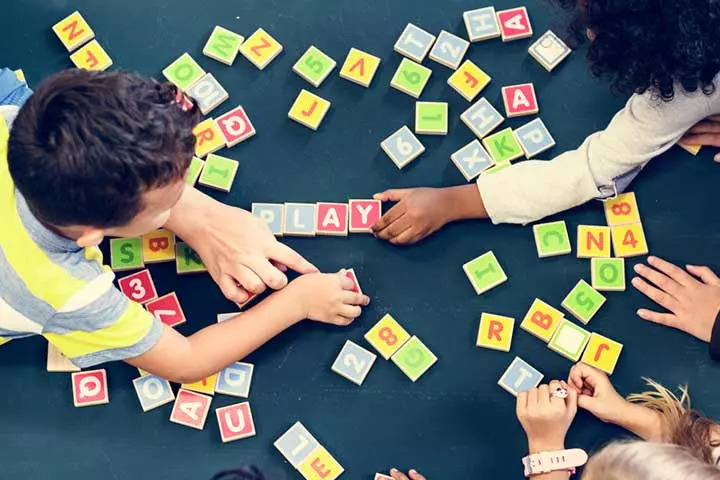
Image: Shutterstock
If your child is just learning the alphabet, this is an easy game to play. However, you can make some minor changes and tweak it for older children.
Age group: 4 to 7 years
No of players: 2 or more
How to play:
- Scatter magnetic letters, plastic letters, or letter blocks on a table.
- Ask your child to pick up a letter from the lot.
- For older children, you can write three- or four-letter words on little chits of paper and do the same procedure as above.
- For children who can read, you can ask them to pick words they see outside shops, etc.
10. Change one letter
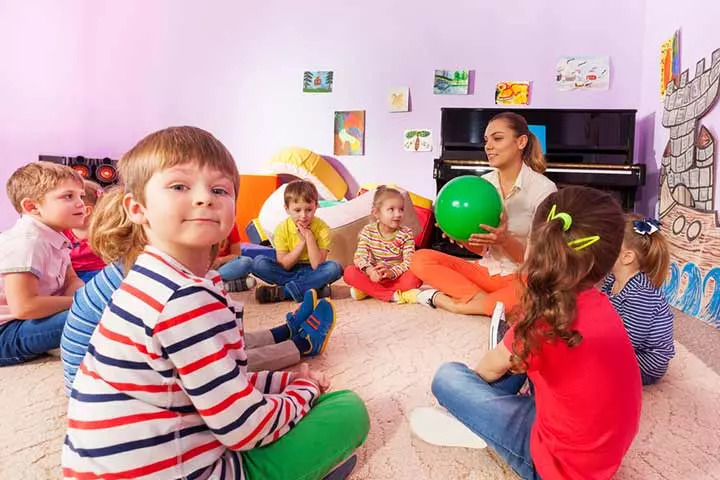
Image: Shutterstock
This is a great word game for school children. The game promotes out-of-the-box thinking and allows your child to come up with new words and even their meanings.
Age group: 5 to 10 years
No of players: 4 or more
How to play:
- Begin with a short word that has three, four, or five letters (according to the age of the children).
- Ask the children to take turns in calling out new words by changing just one letter of the previous word. E.g., park – part – dart – dark / mark – mare – mart / cart – care – case – cast – mast (and so on).
- You can set a timer or divide the players into teams to make the game more exciting.
11. Call my bluff
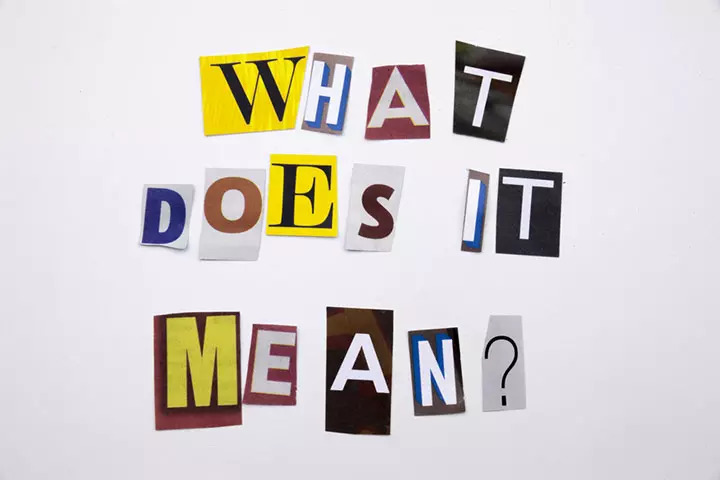
Image: Shutterstock
Call my bluff is commonly played at sleepovers and during picnics and is an excellent word game for older children.
Age group: 8 years and above
No of players: 4 or more
How to play:
- Divide the children into teams.
- Give them a set of words that are common but unfamiliar to them.
- Ask each team to look up the meaning of each word, and make up two wrong meanings for each word.
- Each team asks the other team the meaning of a word and gives them the three options.
- If the opposite team guesses the correct meaning, they get points. If they don’t, the team that asked the meaning gets the point.
- For example, let us take the word “Bewildered.” You can give three choices (a) to be left in the wild, (b) shocked or surprised, and (c) out-of-control behavior.
12. Unscramble the words
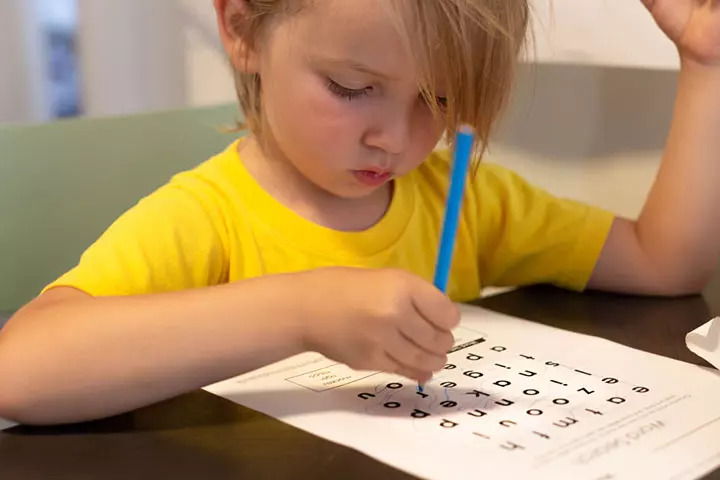
Image: Shutterstock
Let your children put on their thinking caps and play this game. The word game makes your child think and helps stir their imagination and improve their reasoning skills.
Age group: 5 years and above
No of players: 2 or more
How to play:
- Think of a word and write it down on paper but in a scrambled form.
- Your child has to think and arrange the word in the right sequence.
- You could even give clues so that they can unscramble the word faster.
- You could also write down a set of scrambled words, set the timer, and ask them to solve as many as they can within the allotted time.
13. Tell me a story

Image: Shutterstock
Children are incredibly imaginative. Children, as young as three years old, start making imaginary stories. You can play this game to fire your child’s imagination.
Age group: 5 years and above
No of players: 2 or more
How to play:
- Start a “story” with a sentence.
- The next player should say another sentence and continue the story.
- As the story grows, it becomes hilarious and absurd.
- For example, you start with the sentence, “In a village, there was a man named Joe.” The next player can say, “He wore a red shirt every day,” and the next player may say, “One day, a bull charged at him,” and so on.
14. Words in a word
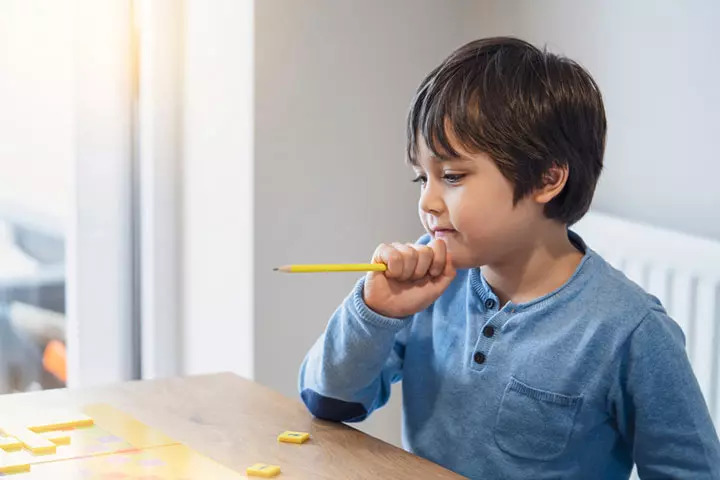
Image: Shutterstock
This is one of the most popular word games for kids and one of the best word-building games of all time. It is useful in improving your child’s English, if it is not your native language. You might have played this game in your childhood. It is now your children’s turn to play the game and keep the tradition alive.
Age group: 5 years and above
No of players: 2 or more
How to play:
- Think of a long word. A popular word choice for this game is “Constantinople.”
- Ask your child to write words starting with each letter in the word. They should use the letters contained in the word only.
- For example, Constantinople can have words such as con, cot, on, oil, no, nap, sit, and sip.
- You can set a timer and ask your child to write down as many words as they can within the given time frame.
15. I’m going on a picnic
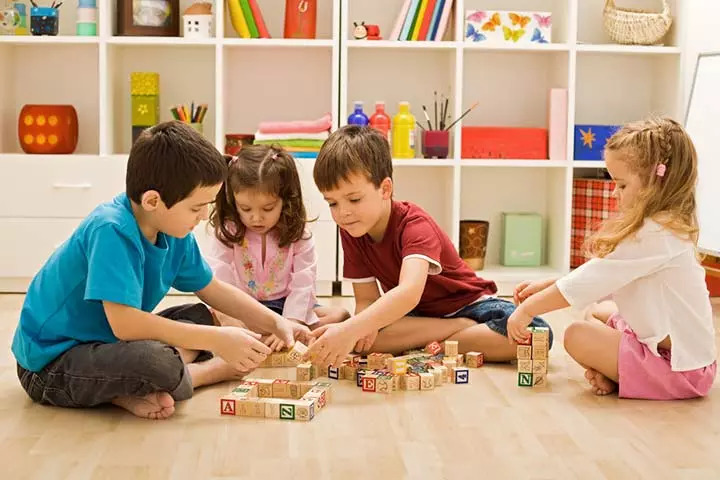
Image: Shutterstock
This game is for older children. It helps hone their creative skills and improves their memory. The word game is usually played in classrooms, but they can play it at a sleepover or even with you as a family game.
Age group: 5 years and above
No of players: 3 or more
How to play:
- The first player starts by saying, “I’m going on a picnic, and I will bring a ….”.
- The next player adds an item to the list and repeats the words.
- Each player has to repeat the items named in the exact sequence.
- If a player forgets a name or the sequence, they are out of the game.
- You can either start the game all over again or ask the next player to pick up the sequence and continue.
- For example, the game goes as follows:
Player 1: I’m going on a picnic, and I will bring a cookie.
Player 2: I’m going on a picnic, and I will bring a cookie and a Popsicle.
Player 3: I’m going on a picnic, and I will bring a cookie and a Popsicle and a bottle of juice, and so on.
16. Crosswords
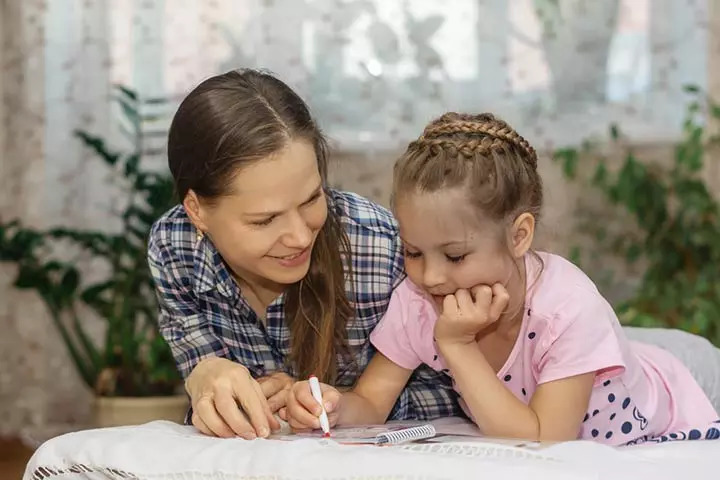
Image: Shutterstock
Solving crosswords requires practice and a lot of patience. The game will not only teach your children new words but also develop their deductive reasoning skills to a great degree.
Age group: 6 years and above
No of players: 1
How to play:
- Draw a grid with white and black squares and number each row and column.
- Then, write a set of clues at the bottom of the grid with the corresponding row or column number.
- Ask your child to solve the crossword.
- You can set a timer to make the game challenging.
- You can get some printable crosswords with clues easily on the Internet (you will find some free and printable crosswords in this link). Crosswords regularly appear in newspapers and magazines.
17. Word quest
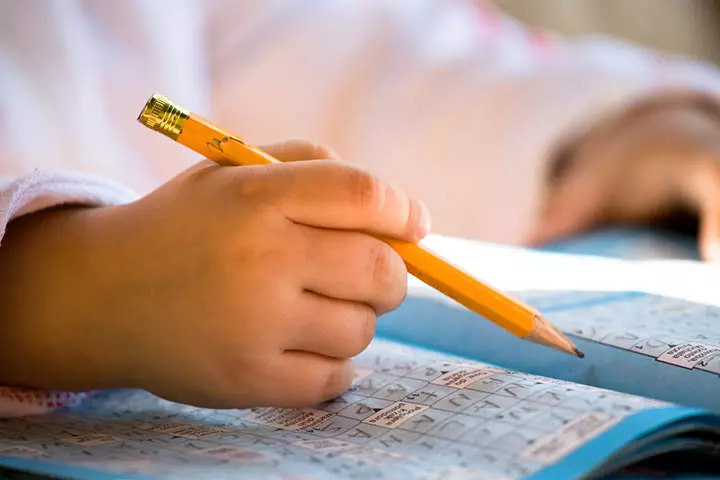
Image: IStock
Word quest is a word game for older kids. The game involves searching for words using single letters and makes your children use their deduction skills.
Age group: 5 years and above
No of players: 2 or more
How to play:
- Draw a 10×10 or 12×12 grid on a sheet of paper and divide it into squares.
- Write various words below and to the side of the grid.
- Write random letters in random squares.
- Ask your child to fill in the grid using the words you have written outside the grid.
18. Consequences

Image: Shutterstock
This word game helps stir the imagination and encourages creativity. The game works well with both children and adults.
Age group: 5 years and above
No of players: 2 or more
How to play:
- The first player writes down a sentence on a sheet of paper and passes it on to the next player.
- The next player writes the next sentence and passes it on.
- Once all the players are done with adding their sentences, you can read out the story.
- You can also write 4–5 sentences with open endings on a sheet of paper and hand them over to each player. Each player writes their version of the story and reads it aloud at the end of the game.
- For example, you can write, “There was a man named …….. He …………. a woman named ……………. They went to …………. He said, “…………………” She said, “……………………” And then, ……………..” and so on.
19. Scrabble
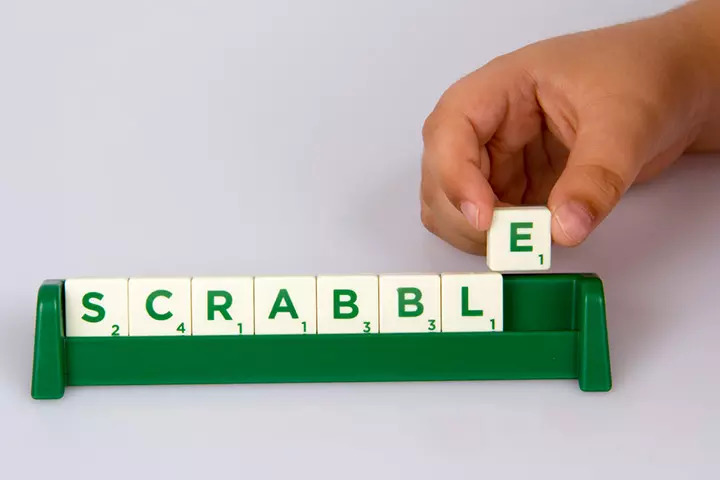
Image: IStock
Scrabble is a popular classic word game for kids. If you want your child to learn new words, this is one of the best games.
Age group: 6 years and above
No of players: 2 or more
How to play:
- Get a scrabble boards.
- Set it up and read the rules.
- The number on each letter tile tells you how many points it’s worth, and the squares on the board tell you how many points you scored.
- The player who gets the maximum score is the winner.
- After a game of Scrabble gets over, the board looks similar to a crossword.
20. Pass the bomb
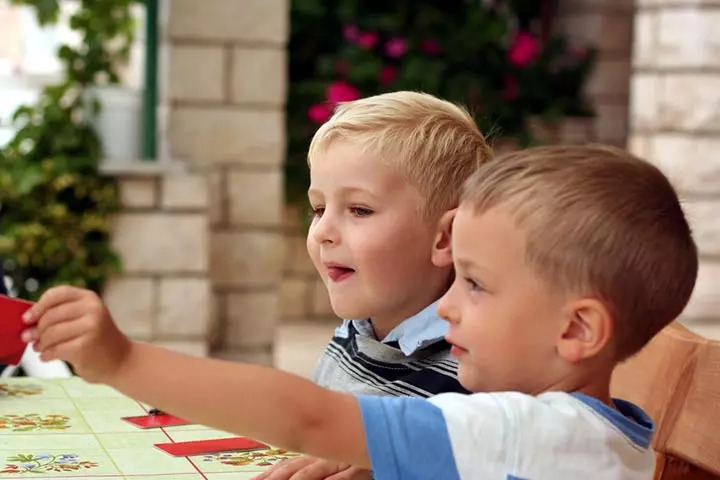
Image: Shutterstock
Pass the bomb is an educational game that will test your child’s alacrity. The first player should say a word and pass the bomb as quickly as possible to the next player, who must say a similar-sounding word. The players need to be quick in passing the bomb before it explodes. You can get this board game at a shop or simply make your own set.
Age group: 5 years and above
No of players: 2 or more
How to play:
- Take a set of card papers and write two- and three-letter words on them with a marker.
- The first player picks up a card and passes it around.
- The “bomb” goes off after a certain time. If you have made the cards at home, you can use a timer or even play music.
- The moment the timer goes off (or the music stops), the player holding the card is out.
- However, before leaving, they have to say a word that contains the word written on the card.
- For example, if the card has “ART” written on it, the child who gets out can say a word with ART in it, such as part, mart, or cart.
1. How can word games help children improve their spelling skills?
When children engage in word games, they are required to focus on the spelling of various words, which helps them to learn and remember the correct spelling of those words.
2. In what ways can word games help children with their grammar?
Word games encourage children to think about language playfully and engagingly, making it easier to understand and remember grammar rules. Word games can also help expand children’s vocabulary, an essential component of good grammar. By learning new words and their meanings, children can improve their ability to express themselves clearly and accurately.
3. How can word games help children improve their vocabulary?
Word games are an excellent way to improve children’s vocabulary skills, as they help them learn new words and reinforce their understanding of familiar ones. Games such as Scrabble, Boggle, and crossword puzzles challenge children to think critically and creatively about words, requiring them to use problem-solving skills to develop new words and find hidden ones.
4. How can word games help children become better readers?
Word games can help children become better readers by improving their vocabulary, spelling, and comprehension skills. Such games require children to identify and create words, helping them to recognize new words and understand their meanings. This eventually improves their reading skills.
When education is imparted as activities and games, children tend to grasp it much faster and retain it longer. So, if you want your children to have great communication skills, fluent vocabulary, and fascinating imagination, involve them in word games for kids. Games, such as I spy, make a word, or hink pink, are effective in keeping children engaged and sharpening their grammar and vocabulary. Another good thing about these games is that you can be involved in playing too. So, choose a suitable word game according to your child’s age and have fun while playing.
Key Pointers
- Word games stimulate the brain to improve reasoning skills, vocabulary, and language skills.
- Spur creativity through games such as I spy, rhyming words, and hink pink.
- Test the memory with games such as guess the correct word and make a word.
Was this article helpful?
The following two tabs change content below.
- Reviewer
- Author
Stupendous!
Can you use it in a sentence?
Updated: March 21, 2022
Originally Published: Dec. 28, 2020

Getty Images
Language really is a beautiful thing. Just think about it — all around the world, people are using different languages to speak and communicate with each other. Language is so vast that we can even communicate thoughts and feelings solely by using our bodies. Expanding on your vocabulary is always a great thing, especially if you’re looking for new ways to get your point across. Big meaningful words shouldn’t be intimidating. Instead, these words should be embraced and used way more often. You’re not an egghead if you use different words to express yourself! Rather, you call that a sesquipedalian (aka lover of long words).
Writers love learning unfamiliar words, but so do kids. That means that language can be a blast and an excellent way to bond with your family. Your family can try to use fancy words every day as a challenge. Making those words positive is even better. Right now, our world needs every little bit of cheer it can get, right? So, here are some fun big words for good, words for beautiful, and — of course — the fanciest of words to express love.
Looking for more pages to help boost your brainpower? Check out our funny brain teasers page and are you smarter than a fifth-grader questions.
Big Words for Good
- Exceptional — unusually excellent; being out of the ordinary
- Positive — fully assured; having or showing a mind free of doubt
- Adept — very skilled; proficient
- Stupendous — astounding and marvelous
- Delightful — highly pleasing
- Favorable — winning approval; marked by impressive success
- Magnificent — great in deed, or exalted in place; impressive to the mind or spirit
- Quintessential — perfectly typical or representative of a particular kind of person or thing
- Marvelous — causing wonder; of the highest kind or quality
- Tremendous — notable by reason of extreme size, power, greatness, or excellence; being such may excite trembling or arouse dread, awe, or terror
- Commonsensical — sound and prudent judgment based on a simple perception of the situation or the facts
- Righteous — genuine, excellent
- Virtuous — having or exhibiting virtue; morally excellent
- Exemplary — deserving imitation because of excellence
- Immaculate — having or containing no flaw or error
Big Words for Beautiful
- Resplendent — shining brilliantly
- Statuesque — majestic dignity, grace, or beauty
- Pulchritudinous — physically beautiful
- Sublime — supreme or outstanding
- Beauteous — beautiful
- Ravishing — enchanting; entrancing
- Splendiferous — extraordinarily or showily impressive
- Ravishing — unusually attractive, pleasing, or striking
- Aesthetical — concerning or characterized by an appreciation of beauty or good taste
- Bewitching — powerfully or seductively attractive or charming
- Exquisite — pleasing through beauty, physical fitness, or perfection
- Captivating — charmingly or irresistibly appealing
- Comely — having a pleasing appearance
- Fetching — attractive, appealing
- Alluring — having a strong, attractive, or enticing quality
- Junoesque — imposingly tall and shapely
- Telegenic — very photogenic
Big Words for Smart
- Resourceful — able to deal skillfully with new situations
- Prompt — quick or alert
- Sagacious — having or showing keen mental discernment or judgment; shrewd
- Canny — astute and skilled
- Astute — very clever and sometimes cunning
- Intelligent — having or indicating a high or satisfactory degree of mental capacity
- Insightful — exhibiting or characterized by insight
- Perceptive — capable of exhibiting keen insight or sympathetic understanding
- Perspicacious — of acute mental vision or discernment
- Discerning — showing insight and understanding
- Knowledgeable — having or showing knowledge or intelligence
- Well-informed — having extensive knowledge, especially of current topics and events
- Enlightened — freed from ignorance and misinformation
- Comprehending — grasping the nature, significance, or meaning of something
- Ingenious — having or showing an unusual aptitude for discovering, inventing, or contriving
Big Words for Amazing
- Prodigious — wonderful or marvelous
- Astonishing — causing astonishment or surprise; amazing
- Astounding — capable of overwhelming with amazement
- Phenomenal — highly extraordinary or prodigious; exceptional
- Breathtaking — exciting, thrilling; very great, astonishing
- Extraordinary — going beyond what is regular or customary; exceptional to a very marked extent
- Sensational — exceedingly or unexpectedly excellent or great
- Awe-inspiring — that arouses awe
- Incomparable — eminent beyond comparison
- Indescribable — surpassing description
- Ineffable — incapable of being expressed in words
- Transcendent — extending or lying beyond the limits of ordinary experience; being beyond comprehension
- Wondrous — that is to be marveled at
- Majestic — having or exhibiting majesty
- Flabbergasting — overwhelming with shock, surprise, or wonder
Big Words About Love
- Devotion — earnest attachment to a cause, person, etc
- Adulation — excessive devotion to someone; servile compliments and flattery
- Allegiance — loyalty or devotion to a person, group, cause, or the like
- Amorousness — the act of being in love
- Amativeness — relating to or indicative of love
- Enamored — affected by strong feelings of love, admiration, or fascination
- Enchantment — the act or art of enchanting
- Reverence — honor or respect felt or shown
- Infatuated — filled with or marked by a foolish or extravagant love or admiration
- Affection — a feeling of liking and caring for someone or something; tender attachment
- Tenderness — gentleness and affection
- Besottedness — related to being blindly or utterly infatuated
- Canonize — to treat as illustrious, preeminent, or sacred
- Canoodle — to engage in amorous embracing, caressing, and passionate kissing
- Predilection — an established preference for something
- Fondness — affection for someone or something
- Endearment — a phrase that expresses love
Other Big Words to Use
- Elucidate — to explain or make something clear
- Selcouth — unusual, strange
- Halcyon — characterized by happiness, great success, and prosperity
- Orphic — mystic, oracular; fascinating, entrancing
- Malaise — physical discomfort or a general feeling of being under the weather
- Scintillating — something fascinating or brilliantly clever
- Ebullience — the quality of lively or enthusiastic expression of thoughts and feelings
- Quiddity — whatever makes something the type that it is; the essence
- Aeonian — lasting for an immeasurably or indefinitely long period of time
- Coruscate — to reflect or give off light in bright beams or flashes; sparkle
- Atelophobia — the fear of not doing something right or not being good enough
- Cimmerian — very dark or gloomy
- Adamancy — the quality or state of being adamant; obstinacy
- Evenfall — the beginning of evening, dusk
- Orgulous — proud
- Parsimonious — frugal
- Tantalizing — tormenting or teasing with the sight or promise of something unobtainable; exciting one’s senses or desires
- Teasing — in a sexual sense, it means to be sexually arousing
- Pulchritudinous — attractive or beautiful
- Bellwether — a leader, trendsetter, or boss
- Accoutrements — accessories
- Magnanimous — courageous, noble, unselfish, or extremely generous
- Unencumbered — free or unburdened with responsibilities
- Acumen — quickness to judge
- Unparagoned — having no equal; matchless, incomparable
- Osculator — someone who kisses
- Anomalistic — deviation or departure from the norm or rules; phenomenal, exceptional
- Usufruct — the right to use and enjoy the profits and advantages of something belonging to another
- Luminescent — something that displays light that is not caused by heat
- Auspicious — favorable, flourishing
- Winebibber — a person who drinks too much wine
- Excogitate — thinking of something carefully or thoroughly
- Gasconading — to brag or gloat
- Idiosyncratic — traits that belong to a person’s character
- Nidificate — to nest
- Cacophony — a loud, obnoxious blend of sounds
- Ennui — feeling simultaneously bored and annoyed
- Aquiver — feeling overcome with emotion
- Umbrage — displeasure, resentment, or anger
- Glib — suave or smooth-talking
- Ubiquitous — universal or everywhere
- Nefarious — wicked or criminal
- Capricious — whimsical, fickle, or careless
- Boondoggle — work or activity that is wasteful or pointless but gives the appearance of value
- Sycophant — a person who flatters someone important in order to take advantage of them
- Mellifluous — sweet or musical, pleasant to hear
- Brogue — a strong outdoor shoe, usually made of leather
- Intelligentsia — intellectuals who form an artistic, social, or political vanguard or elite
- Consanguineous — of the same blood or origin; someone who descends from the same ancestor
- Grandiloquent — a lofty, extravagantly colorful, pompous, or bombastic style, manner, or quality, especially in language
- Psychotomimetic — relating to, involving, or inducing psychotic alteration of behavior and personality
- Perfidiousness — a betrayal of trust
- Preposterous — contrary to nature, reason, or common sense
- Anagnorisis — the point in the plot especially of a tragedy at which the protagonist recognizes his or her or some other character’s true identity or discovers the true nature of his or her own situation
- Circumlocution — the use of an unnecessarily large number of words to express an idea
This article was originally published on Dec. 28, 2020
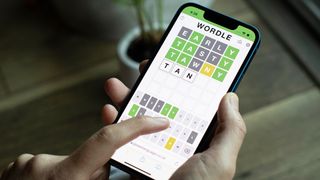
The best Wordle start words are the key to beating the game and avoiding the need to search for today’s Wordle answer.
Without a good start word, your streak is at risk — and nobody wants to lose all that hard wordle work. In fact, I lost my Wordle streak without losing or missing a game, which is pretty frustrating. Plus, even if you’re a bit of a Wordle expert by now, having a great start word will help you turn 4/6s into 3/6s (possibly even 2/6s). Even the NYT’s brilliant WordleBot tool — sadly now behind a paywall — recognizes the importance of a good start word.
I’ve written before about how I’ve played every Wordle so far and lost only once, and No. 1 on my list of tips is to use a good starting word. So that’s what I’ll discuss here.
Read on and I’ll explain what the best Wordle start words are, the math behind them and what alternatives to try.
Most common letters
Best Wordle start words: Most common letters
Before we dive into the list of the words, let’s break down the science behind it.
You don’t have to be a genius to realize that it’s a good idea to use letters that occur more frequently in English. For example, you’re more likely to find an “A” in the word than a “Z.”
In a research paper on English Letter Frequency Counts (opens in new tab), Peter Norvig, director of research at Google, analyzed the data from Google Books to put together a list of most commonly used letters in the English language. His findings concluded that “E”, “T” and “A” were the top three, while “J”, “Q” and “Z” were the least common.
However, that list is based on words in general, rather than Wordle answers — so to really find out which letters feature most frequently in the game, you’d need to analyze them all.
Fortunately, that’s easy to do. Because Wordle’s answers are all freely available in the website’s HTML code, it’s pretty simple to download them, then do a bit of number crunching. This is the list of most most frequently used letters that you get when you do that:
- E
- A
- R
- O
- T
- L
- I
- S
- N
- C
Note that the list above is based on correct Wordle answers, rather than Wordle words; the game accepts some 12,000-plus words as guesses, but only 2,309 are valid solutions.
That’s interesting, then, but it’s just the appetizer for the best Wordle start word main course to follow…
Best Wordle start words
What are the best Wordle start words?
Several people have attempted to use math to determine the best Wordle start words.
One of them was programmer and game designer Tyler Glaiel (opens in new tab), who assigned each letter in Wordle’s 12,972 possible guesses a score of 0, 1 or 2, based on whether it is included in one of the 2,309 answers or not, and whether it is in the right place.
After checking all 12,972 words, the algorithm determined that the best starting options are:
- SOARE
- ROATE
- RAISE
For reasons that are too complex to go into here, Glaiel concludes that ROATE is the best Wordle start word if you want to rule out possible answers as quickly as possible.
However, because ROATE doesn’t actually feature in Wordle’s possible answers list itself, you’ll never get a 1/6 with it. For that reason, Glaiel recommends starting with RAISE.
Programmer Bertrand Fan took a similar approach (opens in new tab) and unsurprisingly came up with a very similar list:
- SOARE
- SAREE
- SEARE
- STARE
- ROATE
Given that the top three don’t feature in Wordle’s possible answers list, that would make STARE the statistically best Wordle start word, based on Fan’s analysis at least.
Coincidentally, Stare is the word independently picked by some of the Tom’s Guide team months ago, without having seen that research, so that’s the one we’d go for.
That decision was instead based on common sense; after all, S is the most common first letter among Wordle answers, A is the most common third letter and E the most common fifth letter. T and R, meanwhile, are the two most common consonants overall in the game.
So there you have it — for the Tom’s Guide team at least, the best Wordle start word is STARE.
Though, a pair of MIT researchers (opens in new tab) have their own pick: SALET (a light medieval helmet). That also gives you five of the top 10 letters, but we’re not as keen on it as STARE — as R is the third-most-used letter, and L is the sixth-most-used. A good alternate for sure.
The best Wordle start word according to WordleBot
The NYT’s excellent WordleBot tool has its own list of the best Wordle start words — and it should know, given it’s made by the people who now run Wordle.
The math behind it is based on how many of Wordle’s 2,309 solutions are left, on average, after you play it, plus the average number of steps needed to solve it and a couple of other metrics. And by that measure, the best Wordle start word is apparently CRANE.
That’s surprising to me — not least because STARE actually fares better in terms of average number of solutions, scoring 71.8 to CRANE’s 78.7. But overall WordleBot awards CRANE a score of 99/100 and STARE only 97, and presumably it’s better at math than I am, it being a computer and all that.
Here are WordleBot’s 10 best Wordle start words:
- CRANE
- SLATE
- CRATE
- SLANT
- TRACE
- LANCE
- CARTE
- LEAST
- TRICE
- ROAST
STARE is at number 12 in this list — so pretty good, if not quite the best.
Vowels and Wordle
Should your Wordle start word have lots of vowels?
Some people swear by playing the likes of ADIEU, AUDIO, ABOUT, CANOE or OUIJA, as they let you use up three or four vowels at the start.
This can be a good alternative approach, as (almost) every Wordle answer has at least one vowel so it makes sense to identify it as soon as possible. But I wouldn’t personally go down that route. ADIEU is not a Wordle answer, so you’ll never get a 1/6 with that. AUDIO is decent, but it doesn’t contain an E — which is not just the most common vowel but also the most common letter in the game. Ditto ABOUT.
CANOE isn’t bad, but C and N are nowhere near as common as S, T or R when it comes to consonants, so what you gain in one aspect you lose in the other. And OUIJA is just a silly suggestion: it doesn’t have an E but it does have a J, which is the second least likely letter to feature in the game at all.
However, vowels are very important in the game in general, so consider them strongly when thinking of a second word. Speaking of which…
Best Wordle second words
What about the best follow-up word?
Of course sometimes even a great start word won’t earn you any yellow or green results. If that happens, you’ll need a good second word.
Which you choose will obviously depend on what your first word was, as you won’t want to repeat any letters you’ve already used. But if I assume you’re following this advice (you’re going to do so, right) and using STARE as your Wordle start word, I’d recommend PHONY, COULD or DOING as good second options.
PHONY is a statistically better option as a second word, because Y is one of the most frequent fifth letters. However, COULD and DOING both use two vowels, and playing your vowels early is always a good strategy, as described above.
Of course, starting words can only take you so far. There’s a lot more you can learning about Wordle simply by using math, and I’ve done just that. In fact, I analyzed every Wordle answer to look for patterns — here’s what I found.
I’ve also put together a list of the best Wordle alternatives in case the original game proves either too easy or too difficult for your taste.
Read next: Your Wordle streak is about to get a multi-device boost — here’s how to get it set up
Get instant access to breaking news, the hottest reviews, great deals and helpful tips.
Formerly Editor in Chief (U.K.) on Tom’s Guide, Marc oversaw all gaming, streaming, audio, TV, entertainment, how-to and cameras coverage, and was also responsible for the site’s U.K.-focused output. He is now U.K. Editor in Chief on TechRadar. Marc previously edited the tech website Stuff and has tested and written about phones, tablets, wearables, streaming boxes, smart home devices, Bluetooth speakers, headphones, games, TVs, cameras and much more. He also spent years on a music magazine, where his duties mainly involved spoiling other people’s fun, and on a car magazine. An avid photographer, he likes nothing better than taking pictures of very small things (bugs, his daughters) or very big things (distant galaxies). When he gets time, he also enjoys gaming (console and mobile), cycling and attempting to watch as much sport as any human can. He’s also fallen in love with Wordle over the past six months and is the author of our today’s Wordle answer column, in which he supplies hints and strategy tips for the mega-popular word game. Given he’s completed every single Wordle so far and only lost once, and analyzed every Wordle answer in search of patterns, he’s well qualified to help you safeguard your streak.
Most Popular
You can say you don’t care if you win or lose at Scrabble, but you may very well be in the minority. Even former President Barack Obama, one of United States’ most high-profile Scrabble enthusiasts, isn’t above boasting about his wins. «It’s his favorite game to play,» then-White House communications director Robert Gibbs said in a 2008 interview with The Independent.
And Obama’s not the only famous Scrabble devotee. Former president Richard Nixon was an avid player. So is actor Daniel Radcliffe, who once had a spirited real-life battle with Harry Potter’s nemesis Draco Malfoy (aka Tom Felton). Late author Vladimir Nabokov, famous for his novel «Lolita,» was a skilled player. Even Queen Elizabeth II is reported to enjoy a royal game of Scrabble [source: McSmith].
Not bad for a pastime invented during the Great Depression. In 1931, out-of-work architect Alfred Mosher Butts came up with a game that he first called Lexiko, then Criss Cross Words. He spent several years tinkering before settling on the rules, now familiar to all Scrabble players: You draw seven letters and try to make words on a board with a 15-by-15 grid. Each letter scores specific points that roughly go along with how hard it is to fit the letter into a word. If an opponent challenges an unusual word, it had better be in the dictionary, or you’ll have to remove it and lose a turn.
Butts’ game didn’t meet with much success initially. But in the 1940s, another game maven, James Brunot, took over. He renamed the game Scrabble and by 1952, it had become a sensation [source: Fatsis].
Scrabble aficionados, like the ones we just mentioned, may memorize long lists of unusual words to win their bragging rights. But casual players can improve their games by learning just a handful of useful entries. You can impress — and even beat — your friends by blitzing them with high-scoring words, or by sneaking in common but strategic words that get rid of unwanted letters. Remember to make use of the double and triple squares to leverage your score on almost any word. And always look for what players call a «bingo,» the 50 extra points you get for using all your tiles on one play.
Now let’s look at 20 words that every Scrabble player should know.
Contents
- Za
- Muzjiks
- Aerie
- Caziques
- Faqir
- Jousted
- Quixotry
- Jukebox
- Zax
- Queue
- Chutzpah
- Xi
- Syzygy
- Wagyu
- Yo
- Zymurgy
- Bezique
- Flapjack
- Qanat
- Aa
20: Za
Challenge! That might be your first instinct, thinking there’s no way this is a word. But «za» is now accepted as slang for pizza and appears in the NASPA Word List 2020. NASPA stands for North American Scrabble Players Association, and it is the final authority for acceptable words in the U.S. and Canada.
Our two-letter word may not be much to look at, but «za» packs a big punch: With 10 points for the «z,» it’ll earn you least 11 total. Hit a triple letter square and you can score 31. Add pepperoni and you’ve got a meal.
19: Muzjiks
Muzjiks are Russian peasants — or so they were called under the tzar (another handy word to know). In Scrabble, «muzjiks» gives you the highest possible opening play. Put the «z» on the double letter square for an initial score of 39. All opening plays score a double word — that makes 78. Add 50 for a bingo, the use of all seven letters in your rack. With a total of 128, you’re off to a terrific start.
18: Aerie
An aerie is an eagle’s nest located on a cliff or some other high location. In Scrabble, the word is a handy way to get rid of four vowels in one fell swoop. You only score five points, but it beats turning your tiles in for new ones and losing a turn in the process.
17: Caziques
When Spanish explorers first reached the West Indies, they found tribes of Indians who described their chiefs using this word. The conquistadors applied the word, which can also be spelled «caciques,» to all native chiefs.
It also refers to a tropical bird similar to an oriole. In a game in England in 1982, Dr. Karl Khoshnaw set the record for the highest single word score in Scrabble competition. He played «caziques» across two triple word squares for a total score of 392.
16: Faqir
«Q» is the best of letters and the worst of letters. It gives you 10 points when you use it, but drags down your score if you end the game holding it. Thinking of «q» words is always a challenge. That’s why it’s a good idea to keep «faqir» in mind.
Faqirs were originally monks in the Sufi sect of Islam, who took vows of poverty. (The word came from the Arabic for «poor man.») The term is now used to refer to any Muslim or Hindu holy man. On the Scrabble board, «faqir» earns you a generous 17 points. And it’s an ideal way to use a «q» if you don’t have its usual partner, the letter «u.»
15: Jousted
Once upon a time, when knights jousted, they had great fun trying to knock each other off their horses with lances. In 2006, two journeyman Scrabble buffs jousted with each other in a game in Lexington, Massachusetts, that involved record high scores.
The loser, Wayne Yorra, opened with a bingo using the word «jousted.» He hit the double letter square with the «j» for an initial score of 23. Doubled, it was 46, plus 50 points for using all his tiles, and Yorra was off to a galloping start with a score of 96.
14: Quixotry
In that same record-setting 2006 game we mentioned previously, which took place in a church basement, winner Michael Cresta stunned Scrabble fans with the permitted word «quixotry.» It means a visionary scheme, action or thought and is derived from the fictional character Don Quixote, whose visions led him to joust with windmills.
Cresta, a carpenter by trade, stretched the word between two triple word squares. With a double letter square under the «x,» he initially scored 35. Two triples multiplies that by nine for 315. Add 50 for the bingo, and Cresta ended with a score of 365, a North American record for a single word. The two men went on to set two more records: Cresta’s final score of 830 was the most points in a game by one player. Combined with Yorra’s 490, the players set a record for most total points at 1,320.
13: Jukebox
Long before the iPod playlist, there was the coin-operated phonograph. Jukeboxes brought popular music to the world for decades and grew into colorful, bubbling neon shrines to pop and rock. The word comes from a Gullah term meaning wicked; it originally referred to a juke house, a brothel.
In Scrabble, you need to keep in mind that high-scoring words don’t have to be obscure. This common word gives you at least 27 points. As an opening bingo, it’s worth a solid 85, which is music to any player’s ears.
12: Zax
This word evolved from «sax,» a single-edge sword of ancient Scandinavia, and came to describe a tool for cutting and punching nail holes in roofing slates. It also refers to the craftsman who uses the tool. It gives the highest possible Scrabble score for a three-letter word: 19. Hit a double or triple letter square, and you’ll do even better. The bonus: You dump two problematic letters at once.
11: Queue
George Washington had one. So does your printer. «Queue» can refer to either a braid of hair hanging down a person’s back, or a line of people, print jobs or anything else. It comes from the Latin word cauda, which means tail.
In Scrabble, «queue» earns a minimum score of 14, nothing to sneer at. Even better, it clears your rack of a bunch of awkward vowels. And, of course, you lose the «q,» a letter you don’t want to be saddled with at the game’s end.
10: Chutzpah
The writer Leo Rosten said chutzpah was when a man murders his parents, then throws himself on the mercy of the court as an orphan. The word reaches us from Hebrew through Yiddish. It can mean either extreme self-confidence or shameless impudence.
You’ll score at least 27 points with chutzpah anywhere on the board. Fit it into either the upper right or lower right corner going across, and you’ll do better, much better. That puts the «z» on the double letter square, giving you an initial 37. It also lets you hit two triple word squares, which multiplies your score by nine. Add 50 for a bingo. You’ll wind up with a phenomenal 383 points and a major boost to your self-confidence.
9: Xi
Xi is the 14th letter of the Greek alphabet, falling between nu and omicron. In English, it’s pronounced something like «sigh.»
You may let out a sigh of relief when you make this play in Scrabble, because it clears your rack of the «x,» which will subtract eight points from your score if you’re stuck with it in the final tally. So keep «xi» in mind. It’s rare that you can’t find a place to squeeze this little word in, dispose of the «x» and pick up nine points in the process.
8: Syzygy
There’s no way to pronounce this word, which describes an alignment of three heavenly bodies, without sounding like you’ve had too much to drink. But it’s a cool and impressive word to keep in mind for Scrabble.
To begin with, you’ll score at least 21 points for «syzygy.» Of course, you’ll need to use a blank, because there are only two «y» tiles in Scrabble. But you can amp up your score if you bring the word into alignment with one of the corners. Hit the double letter square with the «z» and end on a triple word square, and you’ll have a total of 93. A great move when you’re short of vowels.
7: Wagyu
This Japanese breed of cattle provides gourmets with Kobe beef, which can sell for $200 a pound and up. In 2011, «wagyu» was added to the Scrabble word list for play outside the U.S. and Canada. That fact points out a great divide in the Scrabble world. In North America, the Scrabble brand is controlled by Hasbro, which rules on the words that are permissible in tournaments. In the rest of the world, Scrabble is marketed and overseen by Mattel. Different official word lists apply. For casual games, players can choose an ordinary dictionary as the last word in what words can be used.
With the combination AYWUG on your rack, you might be left scratching your head. But remember «wagyu,» and you’ll score at least 12 points initially, with a chance for more with double letter squares — if you live outside North America.
6: Yo
«Yo, my man!» This exclamation is used to get somebody’s attention. Sounds contemporary, but surprisingly, «yo» goes back to the Late Middle English of 1400. Soldiers in World War II used it to mean «present» in a roll call. Sylvester Stallone, in the Rocky movies, used it a lot, too. «Yo, Adrian!»
In Scrabble, it’s a clever way to dump a pesky «y.» It may only score you five points, but that can make a difference in a tight game.
5: Zymurgy
This is the branch of chemistry that deals with fermentation, as in winemaking or the brewing of beer. You might refer to your next kegger as an experiment in zymurgy.
It’s a high-octane word for Scrabble as well. For an opening bingo, put the «z» on the double letter square and you’ll brew up a score of 120. It can be a terrific way to score points when you’re short on vowels.
4: Bezique
Bezique was Winston Churchill’s favorite card game. It’s a high-scoring, trick-taking and melding contest that employs a deck of 64 cards. Its more popular offspring is pinochle.
In Scrabble, the word bezique can be a winner. You’ll score a minimum of 27 points when you play it anywhere on the board. But use it as an opening bingo with the «q» on a double letter square and you’ll score 124, one of the highest possible openings.
3: Flapjack
In America, this is another word for pancake. Cowboys washed them down with bad coffee for breakfast. But in Britain, a flapjack is a chewy sweet made from oats.
You might overlook flapjack as a mundane word, but it can be a high Scrabble scorer. Hit a double letter square with the «j» and you’ll score 34. Stretch it between two triple word squares and you’ll end up with a sweet 356.
2: Qanat
A qanat is a tunnel used in arid regions for irrigation. It was invented in Iran, then called Persia, about 2,500 years ago and is still used today. It taps into underground water and uses the slope of the land to bring that water to where it’s needed without pumping.
A rack containing these letters can be maddening. Two «a’s» and no «u» to go with the «q.» But don’t despair. Qanat clears most of your letters and rids you of «q,» scoring you at least 14 points in the process.
1: Aa
Solidified lava comes in two forms. Aa is rough like cinders. Pahoehoe, formed from hotter lava, is smooth. Both words are Hawaiian.
The game is winding down. This could be your last play. You can fit the word in almost anywhere there’s another «a.» It’s only worth two points, but if they allow you to edge out your opponent, you’ll be bragging about those two points for a while.
Originally Published: Feb 22, 2012
Lots More Information
Related Articles
- 48 Commonly Misspelled Words
- 10 Fun Family Night Ideas
- How Scrabble Works
- Top 10 Mind-bending Strategy Games
- Top 5 Ways to Get Smarter
Sources
- Bialik, Carl. «Price Drop: Stocks, Homes, Now Triple-Word Scores.» Wall Street Journal. March 18, 2009. (April 7, 2022) http://online.wsj.com/article/SB123731266862258869.html
- Burkeman, Oliver.»Spell bound.» The Guardian. June 27, 2008. (April 7, 2022) http://www.guardian.co.uk/lifeandstyle/2008/jun/28/healthandwellbeing.familyandrelationships
- Donahue, Daniel. «Important Scrabble News: Two New Q (Without U) Words.» Wired. May 9, 2011. (April 7, 2022) http://www.wired.com/geekdad/2011/05/important-scrabble-news-two-new-q-without-u-words/
- McSmith, Andy. «The sublime joy of Scrabble.» The Independent. Dec. 15, 2008. (April 7, 2022) http://www.independent.co.uk/news/uk/this-britain/the-sublime-joy-of-scrabble-1067061.html
- Fatsis, Stefan. «How a Massachusetts carpenter got the highest Scrabble score ever.» Slate.com, Oct. 26, 2006. (April 7, 2022) http://www.slate.com/articles/technology/gaming/2006/10/830.single.html
- Fatsis, Stefan. «Present at the Creation: Scrabble.» Morning Edition, NPR.org. Aug. 19, 2002. (April 7, 2022) https://www.npr.org/2002/08/19/1148572/scrabble
- National Scrabble Association. «History of Scrabble.» (April 7, 2022) https://web.archive.org/web/20120202111144/http://www.scrabble-assoc.com/info/history.html
- Swenson, Christopher. «Best Words in Scrabble.» The Science of Board Games. (Feb. 9, 2012) http://www.scienceofboardgames.com/2007/12/best-words-in-scrabble/
- The Telegraph. «Scrabble: 60 facts for its 60th birthday.» telegraph.co.uk. December 15, 2008. (Feb. 9, 2012) http://www.telegraph.co.uk/news/newstopics/howaboutthat/3776732/Scrabble-60-facts-for-its-60th-birthday.html

